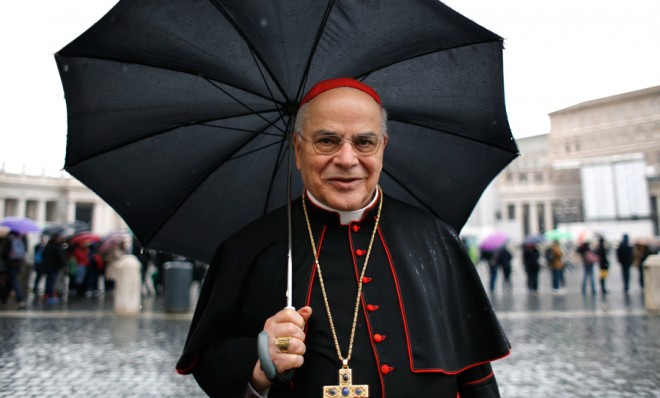How you can help pick the next pope — or at least bet on it
If you don't believe the power of prayer can help you influence the cardinals' ultimate choice, you can at least play a Sweet Sistine bracket game


A free daily email with the biggest news stories of the day – and the best features from TheWeek.com
You are now subscribed
Your newsletter sign-up was successful
The 115 eligible cardinals gathered in the Vatican are the only people on earth who can pick the next pope — and they vote today on when to start their conclave to do just that. But you can help, indirectly, if you have an email address and a few prayers to spare. On Friday, the Vatican gave its official blessing to Adopt a Cardinal, a website launched by Germany-based Catholic youth organization Jugend 2000 (Youth 2000).
Here's how it works: You enter your name and email address in the "adopt" section of the site, and Adopt a Cardinal sends you the name and information about a randomly selected cardinal-elector, "who you will support through your prayer and intercession during the coming weeks before and during the conclave and for three days following the election." The cardinals know they are being adopted: They were told about the website in their gathering Friday morning, where they also talked about a whole host of issues the next pope will have to face. Picking a new pope is generally seen as the most important thing most of these princes of the church will ever do. "The cardinals need to be prayed for," said Ulli Heckl, 37, one of the Germans who created the website.
As of Friday morning, more than 360,000 people have adopted one of the cardinals.
The Week
Escape your echo chamber. Get the facts behind the news, plus analysis from multiple perspectives.

Sign up for The Week's Free Newsletters
From our morning news briefing to a weekly Good News Newsletter, get the best of The Week delivered directly to your inbox.
From our morning news briefing to a weekly Good News Newsletter, get the best of The Week delivered directly to your inbox.
If adopting a cardinal elector is not your thing, there are other, less "reverent" interactive papal-selection tools, says Bill Ward at the Minneapolis Star Tribune. "Ever since Pope Benedict proclaimed that he was to become the Holy See You Later, speculation has been rampant as to who would replace him," and the gambling sites have rushed in — "Ghana's Cardinal Peter Turkson is the current favorite at 5-2." But there are also less sinful sporting-style prognostication sites.
One is called Fantasy Conclave: "It's like fantasy baseball, except these Cardinals are not from St. Louis," says Ward. It is not, surprisingly, "the brainchild of an iconoclast." Fantasy Conclave is the work of "eCatholic Evangelist" Michael Marchand, and he fashioned it to educate and entertain; each day, players get emails about popes and the elaborate papal selection process.
"Slightly more catholic (in the lowercase sense) is Pope Madness 2013," Ward says, an NCAA basketball–type bracket systems with "reverent round names" — Sweet Sistine, Ecumenical Eight, Flagellant Four, and Diocese Duo. And it does have "regionals that actually live up to their names (South American, Italian, etc.)." Religion News Service has a similar Sweet Sistine bracket game.
The only contest with a prize, though, is Fantasy Conclave, which is offering up swag from sponsors, including a $100 restaurant.com gift card, Catholicism DVD series and study guides, autographed copies of Catholic books and a life-size cutout of Pope Benedict. [Star Tribune]
A free daily email with the biggest news stories of the day – and the best features from TheWeek.com
Peter has worked as a news and culture writer and editor at The Week since the site's launch in 2008. He covers politics, world affairs, religion and cultural currents. His journalism career began as a copy editor at a financial newswire and has included editorial positions at The New York Times Magazine, Facts on File, and Oregon State University.
-
 Crisis in Cuba: a ‘golden opportunity’ for Washington?
Crisis in Cuba: a ‘golden opportunity’ for Washington?Talking Point The Trump administration is applying the pressure, and with Latin America swinging to the right, Havana is becoming more ‘politically isolated’
-
 5 thoroughly redacted cartoons about Pam Bondi protecting predators
5 thoroughly redacted cartoons about Pam Bondi protecting predatorsCartoons Artists take on the real victim, types of protection, and more
-
 Palestine Action and the trouble with defining terrorism
Palestine Action and the trouble with defining terrorismIn the Spotlight The issues with proscribing the group ‘became apparent as soon as the police began putting it into practice’
